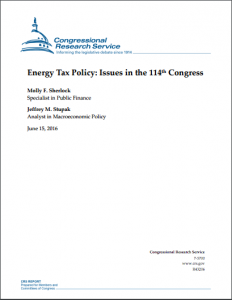Full Title: Energy Tax Policy: Issues in the 114th Congress
Author(s): Molly F. Sherlock & Jeffrey M. Stupak
Publisher(s): Congressional Research Service
Publication Date: June 1, 2016
Full Text: Download Resource
Description (excerpt):
Energy tax policy involves the use of one of the government’s main fiscal instruments, taxes (both as an incentive and as a disincentive) to alter the allocation or configuration of energy resources and their use. In theory, energy taxes and subsidies, like tax policy instruments in general, are intended either to correct a problem or distortion in the energy markets or to achieve some economic (efficiency, equity, or even macroeconomic) objective. The economic rationale for government intervention in energy markets is commonly based on the government’s perceived ability to correct for market failures. To correct for these market failures governments can utilize several policy options, including taxes, subsidies, and regulation, in an effort to achieve policy goals. In practice, energy tax policy in the United States is made in a political setting, determined by fiscal dictates and the views and interests of the key players in this setting, including policymakers, special interest groups, and academic scholars. As a result, enacted tax policy embodies compromises between economic and political goals, which could either mitigate or compound existing distortions.
